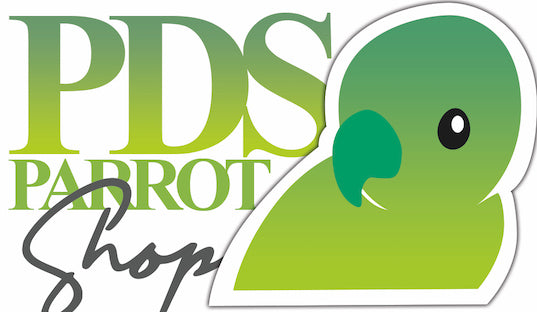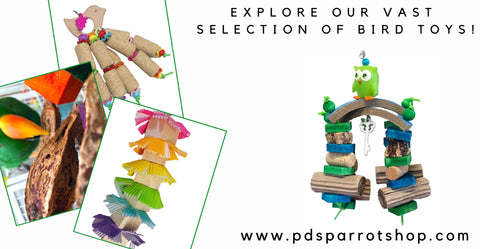
Seeds for Parrots
Share
If you're a parrot owner, you know how important it is to provide your pet parrot with a balanced diet. While seeds often come to mind when thinking of bird food, they are just one piece of the nutritional puzzle. So, what seeds are best for parrots, and how can you ensure your parrot gets the right mix of nutrients?
Parrots can enjoy a wide range of seeds, such as pumpkin, hemp, chia, sesame, millet, milk thistle, and flaxseeds. Let's go into more depth. This is just one of the many feeding topics we explore in The Science of Avian Nutrition, written by our founder with 12+ years of rescue experience.

Understanding Parrot Nutrition
Parrots, like humans, require a variety of nutrients to stay healthy. These include proteins, fats, vitamins, minerals, and fibers. While seeds do provide some of these nutrients, a seed-only diet can be inadequate, leading to malnutrition and health issues over time. That's why it's crucial to understand which seeds offer the best nutritional value and how they fit into a broader, balanced diet.
Types of Seeds Fed to Parrots
Let's explore some of the most popular seeds that are commonly fed to parrots and their nutritional benefits:
Sunflower Seeds
Sunflower seeds are a favorite among parrots, but they are high in fat. While they do offer a good source of protein and vitamin E, they should be given in moderation to avoid obesity and related health issues.
Millet Seeds
Millet seeds are a low-fat option rich in magnesium, which is essential for a parrot’s bone health. They are a good choice for smaller parrots like budgies.
Safflower Seeds
Safflower seeds are heart-healthy, containing good fats that support cardiovascular health. They are also lower in fat than sunflower seeds, making them a better option for weight management.
Hemp Seeds
Hemp seeds are packed with omega-3 fatty acids, which are beneficial for a parrot’s skin and feather health. These seeds also provide a good balance of protein and fiber.
Canary Seeds
Canary seeds are another protein-rich choice, especially popular for small to medium-sized parrots. They offer a balanced mix of essential amino acids that support overall health.
Pumpkin Seeds
Pumpkin seeds are loaded with zinc and magnesium, crucial minerals for a parrot’s immune system and bone health. They also provide a satisfying crunch that parrots enjoy.
Flax Seeds
Flax seeds are an excellent source of fiber and omega-3 fatty acids, promoting digestive health and a shiny plumage in parrots.
Sesame Seeds
Sesame seeds are small but mighty, offering a rich source of calcium, which is vital for strong bones and healthy beak formation. They also provide healthy fats and can be a tasty addition to a parrot's diet when offered in moderation.
Milk Thistle Seeds
Milk thistle seeds are known for their liver-supporting properties. They contain silymarin, a compound that helps protect the liver from toxins and supports overall liver health. These seeds can be a beneficial supplement, especially for parrots with liver concerns.
Fennel Seeds
These aromatic seeds are small, easy to chew, and may help with digestion. Many parrots enjoy their mildly sweet, licorice-like flavor.
Pepper Seeds
Safe and full of flavor, pepper seeds (from sweet or hot peppers) are not only edible but also loved by many parrots. Birds aren’t sensitive to capsaicin, so even hot pepper seeds are a safe, fun option for most parrots.
Looking for more variety? Explore our guide to grains for birds to discover nutrient-dense staples that complement seeds in a balanced diet.
Nutritional Benefits of Different Seeds
Each type of seed offers unique nutritional benefits. However, the key is moderation and variety. A parrot's diet should not rely solely on seeds, even the healthiest ones, as they can lead to imbalances if overfed.
How to Safely Offer Seeds to Birds
- Moderation is Key: While seeds are healthy, they are calorie-dense and should not make up the majority of your bird’s diet.
- Avoid Additives: Always choose raw, unsalted seeds without added oils or flavorings.
-
Variety Matters: Rotate different seeds to ensure your bird gets a wide
range of nutrients. - Storage Tips: Store seeds in an airtight container in a cool, dark place to keep them fresh and free of pests.
Combining Seeds with Other Foods
Seeds should be just one component of a parrot's diet. Incorporating fresh fruits, vegetables, and grains provides a balanced intake of nutrients. Pellets designed for parrots also ensure they receive the necessary vitamins and minerals.
Sprouting Seeds for Parrots
Sprouted seeds are a fantastic way to boost the nutritional content of seeds. They are easier to digest and provide increased levels of vitamins and enzymes. To sprout seeds safely, ensure they are rinsed thoroughly and kept in a clean environment to prevent mold growth.
How Much Seed Should a Parrot Eat?
The amount of seed a parrot should consume varies by species, size, and activity level. It's important to monitor your parrot's health and adjust their diet as needed to maintain an optimal weight and overall wellness.
The Role of Seeds in a Balanced Diet
Seeds should complement a diet rich in fresh fruits, vegetables, and other whole foods. They are best used as a reward or occasional treat rather than a primary food source.
At PDS Parrot Shop, we advocate for balanced and varied nutrition to keep your pet birds happy and healthy.
For more healthy additions like fennel, explore our guide to Herbs for Parrots to discover how fresh herbs can boost your parrot’s diet and enrichment.
Check out our guide to Healthy Nuts for Birds to learn which nuts offer the best nutrition and how to serve them safely.
Common Myths About Seeds and Parrots
Myth: Seeds Alone Are Enough
Seeds alone cannot meet all of a parrot's nutritional needs. A varied diet is essential for long-term health.
Myth: All Seeds Are Created Equal
Not all seeds offer the same nutritional value. Some are high in fats, while others provide essential nutrients like omega-3s or magnesium.
Myth: Parrots Can Overeat Healthy Seeds
Even seeds with health benefits can cause issues if overconsumed. Balance and moderation are key.
Tips for Selecting High-Quality Seeds
When choosing seeds for your parrot, consider the following:
Organic vs. Non-Organic Seeds
For more information about organic vs non-organic please read: Organic vs Traditional Foods for Your Pet Bird: An Expensive Trend?
Avoiding Additives and Preservatives
Choose seeds that are free from added salt, sugar, or preservatives, as these can be harmful to your parrot's health.
Where to Buy Quality Seeds
Purchase seeds from reputable pet stores or online suppliers that specialize in seeds to ensure you are getting fresh, high-quality products. Click here for a specialized health smart seed mix.
Storing Seeds Properly
Proper storage is crucial to keep seeds fresh and prevent spoilage. Store seeds in a cool, dry place, and consider using airtight containers to maintain freshness.
Feeding your parrot the right seeds is an important part of maintaining their health and happiness. While seeds are a valuable part of a parrot's diet, they should be offered alongside a variety of other foods to ensure balanced nutrition. By choosing the right seeds, incorporating fresh foods, and avoiding harmful options, you can help your parrot thrive.
Cookbook
The Science of Avian Nutrition
Monika Sangar
Co-founder of Prego Dalliance Sanctuary, Artisan of PDS Parrot Shop, Author
Monika Sangar is a parrot rescuer, bird food chef, and toy designer with over a decade of experience in avian care and nutrition. She is the founder of Prego Dalliance Sanctuary and the author of The Science of Avian Nutrition, a cookbook dedicated to fresh, healthy meals for parrots. Explore more bird care tips and bird toys at PDS Parrot Shop!

